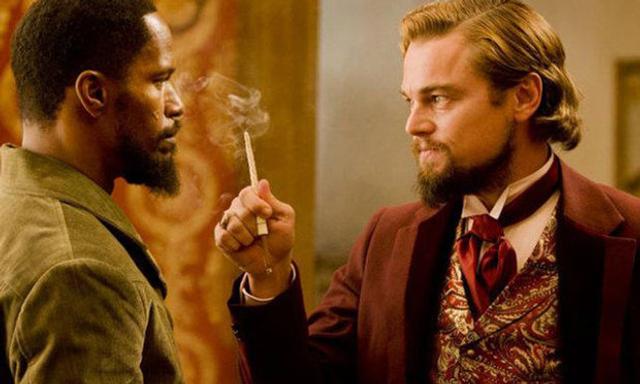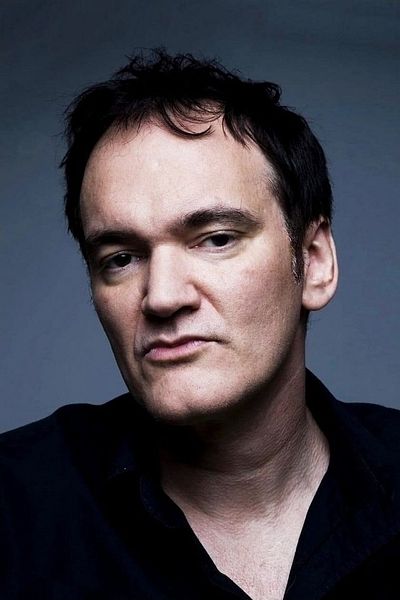Of the many plantations along the River Road that leads out of New Orleans, following the path of the Mississippi, Evergreen Plantation might be the most beautiful. Its long paths are lined by grand oak trees, with Spanish moss delicately clinging on. Still a working sugar cane plantation, it features 37 buildings on the National Register of Historic Places, including 22 antebellum slave cabins that speak of the true horror witnessed in the South in years past.
Today, amidst the frequent storms that shake this part of the United States, Quentin Tarantino has resurrected a small part of that history. Marching in single file, their arms and legs in chains, is a group of slaves being led into "Candie Land", the fictional plantation that lies at the centre of his new film DJANGO UNCHAINED. Leading them in, dressed in full cowboy outfit atop a horse, is Jamie Foxx as the titular Django, passing for a freed slave-turned-slaver to gain access to Candie's protected fortress.
It's Tarantino's first foray into the Western genre, here inspired by his beloved Spaghetti Westerns. With a title borrowed from Sergio Corbucci's 1966 epic DJANGO, in which Italian actor Franco Nero played the mysterious gunslinger, Tarantino's DJANGO UNCHAINED is his typically-fearless attempt to tell a Western led by a slave, and shine a light on one of the darkest periods in American history.
What's especially surprising about DJANGO UNCHAINED, is how quickly the project came together. Tarantino remembers an Oscar party, in the year INGLOURIOUS BASTERDS had been on the awards circuit. It was there that he started discussing the state of the Western genre with producer Reginald Hudlin, himself a noted director of films like HOUSE PARTY and BOOMERANG.
"We started talking about movies set in this time period," recalls Hudlin. "I basically said I hated all of them. I hated the Hallmark greeting card movies. I wanted movies that told the truth about slavery, and that had clear-cut victories. My idea of a great slave movie was SPARTACUS. And until there was something like that about the American slave experience I wasn't interested."
It set Tarantino's mind racing, and immediately he started drafting what would become DJANGO UNCHAINED. "It just poured out of me," Tarantino says. "I was in Japan doing the last of my press tour and Spaghetti Westerns, they call them Macaroni Westerns there, are so very, very popular. I went and picked up a bunch of soundtracks and as I was listening to them the basic outline of the story came to me. I ended up writing the first scene while I was there. And it's fairly similar to what exists today."
Adds Hudlin: "I thought the topic was over, but Quentin called me last April and said, 'Hey, I've got this new script and you got me into this thing!'"
In the end it took Tarantino six months to write a finished draft, a speedy job for him. "In fact I even slowed it down," he laughs. "I got to the middle point and backed off for a couple of weeks or so, because I worried that perhaps I was going too fast. I had about three different spots where I got to a certain point and kind of marinated for a few weeks before I continued telling the story."
For Hudlin, producing DJANGO UNCHAINED meant connecting with the roots which bind most of the country's African American population. "Even though this was a work of fiction, there were people like this in my family," he says. "My great-great-grandfather was a conductor on the Underground Railroad. So these are true-life historical characters that have long needed to be represented. And not in some sanitised, 'Oh, isn't this nice' movie but a foot-to-ass balls-out Quentin Tarantino action film."
The challenge of finding an actor capable of bringing Tarantino's iconic lead to life wasn't easy. "I had no idea who was going to play it, so I met with six different actors," Tarantino says. "Jamie Foxx came to my house and I was going to put him through the ringer and really test him out. He was the last one I saw. You just know when you meet the guy and I met the guy. He understood and he was the cowboy."
As it turns out, the dream of playing a cowboy had long been in Foxx's mind. "Everyone wants to be a cowboy, man," he says. "As a kid I grew up in Texas and I had toy guns. I got a horse for my birthday four or five years ago, so I'm riding my own horse in the movie."
Foxx, in fact, grew up little more than eight hours drive away from the Evergreen Plantation location of the DJANGO shoot. "It was almost like, that's what we were used to," he says. "That's the way it is. Even now, how certain things are happening with that racial component, it's because of this. It's because of some of that mentality not being washed out yet."
Agrees Hudlin: "It affects all of us in the cast and crew. When we're doing a scene in which one of the characters is getting tied to a tree, and is about to be whipped, it's a whole thing to realise that really happened here. It happened with a horrifying regularity. It's no different from shooting a film about the holocaust in Auschwitz. The disturbing thing is that Auschwitz at least looks like a prison; this is beautiful. It can lull you into a false sense of security. It's a beauty that's been paid for in blood."
Foxx is impressed by Tarantino's courage. "He's hip-hop, man," he laughs. "This is going to be a tough film to do, but the way he's shooting and the pleasant and great things he's finding are amazing. That's why he's Quentin Tarantino."
For Tarantino himself, tackling such sensitive subject matter comes with no hesitation. "I always know that a couple of people will say some things about it," he admits. "But then that goes away and the movie is the movie. And I don't let anything anybody might possibly say ever stop me from doing anything anyway!"
DJANGO UNCHAINED, then, seems certain to represent everything Tarantino: courageous, energetic and above all entertaining.
By Joe Utichi



















































































